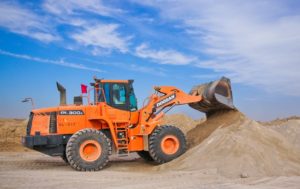
Before breaking ground on a construction site, one must test the soil to see its quality for building upon. Natural soil can be too weak and infirm for roadways, airport runways, building pads, and other structures, resulting in shifting or sinking foundations. The soil must be able to bear the load of the structure and vehicles or people that may use it. That’s where soil stabilization comes in. Here’s a look at soil stabilization and the difference between lime and cement soil stabilization.
What Is Soil Stabilization?
Soil stabilization is the addition of chemicals to the natural soil to improve its hardiness for building foundations upon it. When the soil itself can keep the foundation of buildings, roads, parking lots, and so on stable, the foundations themselves do not have to be as thick, saving significant costs. Soil stabilization typically happens on-site, mixing the materials with the soil directly. Much evaluation, testing, and planning happen beforehand to ensure the right chemical and the right amount go into the soil.
Lime Soil Stabilization
Lime is one material used for soil stabilization. Lime in construction is either quicklime or hydrated lime, also known scientifically as calcium oxide and calcium hydroxide. Quicklime comes in two forms, high calcium and dolomitic. High calcium quicklime is almost pure calcium oxide, but dolomitic quicklime includes magnesium oxide. Meanwhile, hydrated lime is a wetter form of quicklime. Both quicklime and hydrated lime have the calcium needed to strengthen the soil, but hydrated lime is more suitable for dryer soil conditions.
Cement Soil Stabilization
Cement soil stabilization is the addition of cement or soil cement to the untreated ground before construction. Cement also contains calcium, besides iron derived from limestone, silica, alumina, clay, and sand. Portland cement, which is ground into a powder for use, is the most common type. Mixing it with water and the natural soil, one can form a new, stabilized soil. Another option is soil cement, a premixed product of natural soil, cement, and water. To learn more about your options and the strengths of each, contact us at Reliable Contracting in Maryland!
ABOUT RELIABLE CONTRACTING
Reliable is dedicated to delivering quality products, displaying professionalism within the firm, seeking new opportunities for expansion and profitability, and providing an environment for individual success. If you have a commercial or residential construction project that you need taken care of, please contact Anne Arundel County’s largest site-work contractor today by calling 410-987-0313 or visiting our website. You can also follow Reliable Contracting on Facebook, LinkedIn, Pinterest, and Twitter!
Reliable Contracting Company serves the following and surrounding counties: Annapolis, Queen Anne’s, Anne Arundel, Baltimore, Baltimore City, Calvert, Caroline, Charles, Howard, Prince George, St. Mary’s, Talbot, and Washington D.C.
